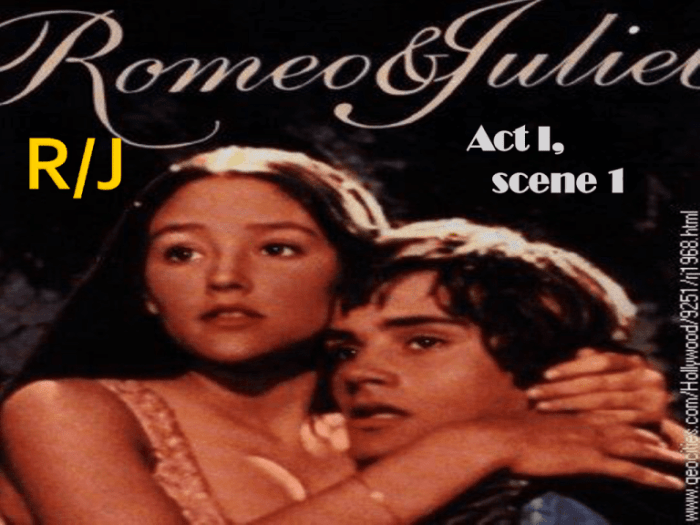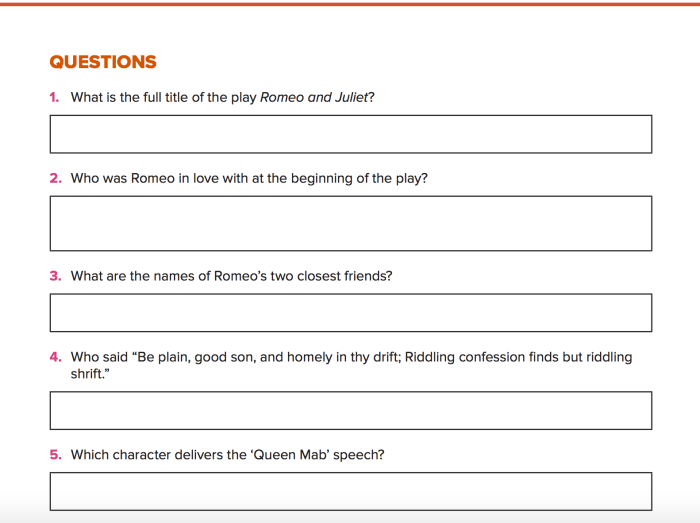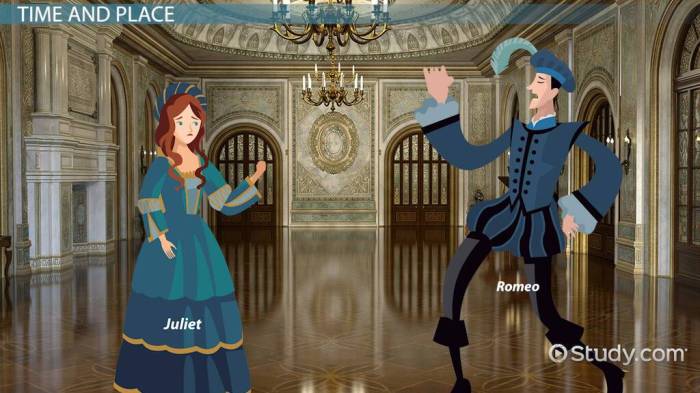Discussion questions romeo and juliet – In this captivating exploration, we delve into the complexities of “Romeo and Juliet,” uncovering its timeless themes and characters through a series of thought-provoking discussion questions. Prepare to engage with the play’s profound insights into love, fate, and the human condition.
Romeo and Juliet’s Forbidden Love

Romeo and Juliet’s love is forbidden due to the bitter feud between their families, the Montagues and Capulets. The feud has created a deep-rooted animosity between the two families, making any relationship between their members unacceptable.
Social Barriers
The social barriers preventing Romeo and Juliet’s relationship include the societal norms and expectations of their time. In Verona, families arranged marriages for their children, and it was considered inappropriate for young people to choose their own partners. The Montagues and Capulets are wealthy and influential families, and their children are expected to marry into other wealthy and influential families to maintain their social status.
Cultural Barriers
Cultural barriers also contribute to the forbidden nature of Romeo and Juliet’s love. The feud between the Montagues and Capulets has created a culture of hatred and mistrust between the two families. Any relationship between a Montague and a Capulet is seen as a betrayal of their family and their culture.
Romeo and Juliet are aware of these cultural barriers, and they know that their love is dangerous and could have serious consequences.
Examples from the Play
- When Romeo and Juliet first meet at the Capulet’s ball, they are both immediately attracted to each other. However, they are both aware of the feud between their families, and they know that their love is forbidden.
- When Romeo is banished from Verona for killing Tybalt, Juliet is devastated. She knows that she cannot live without him, and she decides to take her own life rather than marry someone else.
- The deaths of Romeo and Juliet are a tragedy. Their love is forbidden by their families and their culture, and they are ultimately unable to overcome these barriers.
The Role of Fate and Destiny
The play of Romeo and Juliet revolves around the concept of fate and destiny. The characters are constantly faced with external forces that seem to be beyond their control, and these forces ultimately shape their actions and lead to their tragic end.
One of the most important examples of this is the feud between the Montagues and Capulets. This feud is a long-standing one, and it has created a cycle of violence that seems impossible to break. Romeo and Juliet are both victims of this feud, and they are ultimately unable to escape its deadly consequences.
Fate and Free Will
The question of fate versus free will is a central theme in Romeo and Juliet. The play suggests that our actions are often shaped by forces beyond our control, but it also shows that we have the power to make our own choices.
Romeo and Juliet make several choices that lead to their downfall, and these choices are ultimately their own responsibility. However, the play also suggests that these choices are influenced by the circumstances in which they are made. Romeo and Juliet are both young and inexperienced, and they are living in a society that is full of violence and hatred.
These factors make it difficult for them to make wise choices, and they ultimately pay the price for their mistakes.
Key Moments of Fate
There are several key moments in the play where fate intervenes and alters the course of events. One of the most important of these moments is the meeting between Romeo and Juliet at the Capulet’s ball. This meeting is a chance encounter, and it is the beginning of their tragic love affair.
Another key moment of fate is the death of Tybalt. Tybalt is Juliet’s cousin, and he is killed by Romeo in a duel. This event leads to Romeo’s banishment from Verona, and it ultimately sets the stage for the lovers’ tragic end.
Conclusion
The role of fate and destiny is a complex one in Romeo and Juliet. The play suggests that our actions are often shaped by forces beyond our control, but it also shows that we have the power to make our own choices.
Romeo and Juliet make several choices that lead to their downfall, but these choices are ultimately their own responsibility.
The Theme of Love and Loss

Romeo and Juliet is a timeless tale of love and loss. The play explores the different types of love, including romantic, familial, and platonic, and how the loss of loved ones can profoundly affect the characters and the plot.
Romantic Love
The central focus of the play is the romantic love between Romeo and Juliet. Their love is passionate, intense, and ultimately tragic. They are willing to risk everything for each other, even their own lives.
Familial Love
Romeo and Juliet’s families are deeply involved in the play. The Montagues and Capulets are sworn enemies, and their feud has a devastating impact on the young lovers. The loss of a family member, such as Tybalt or Mercutio, is a major turning point in the play.
Platonic Love
Romeo and Juliet also have platonic relationships with other characters. Friar Laurence is a wise and compassionate figure who tries to help the young lovers. The Nurse is a loyal and devoted servant who cares for Juliet. These relationships provide some comfort and support to the young lovers in the midst of their tragic circumstances.
The Impact of Loss
The loss of loved ones has a profound impact on the characters and the plot of Romeo and Juliet. The death of Tybalt leads to Romeo’s banishment from Verona. The death of Mercutio leads to Romeo’s death. The death of Juliet leads to Romeo’s suicide.
The play shows how the loss of loved ones can lead to violence, despair, and tragedy.
The Setting of Verona
Verona, the setting of Romeo and Juliet, plays a crucial role in shaping the events of the play. The city’s social and political landscape exerts a profound influence on the characters’ actions and decisions, ultimately leading to the tragic conclusion.
Social Landscape
Verona is a highly stratified society, divided along familial and economic lines. The Montagues and Capulets, two prominent families, engage in a long-standing feud that permeates all aspects of life in the city. This feud creates an atmosphere of violence and suspicion, making it difficult for the young lovers, Romeo and Juliet, to pursue their relationship.
Political Landscape
Verona is ruled by Prince Escalus, who attempts to maintain order and prevent the feud from escalating. However, his authority is limited, and the Montagues and Capulets continue to defy his commands. The political instability and lack of effective leadership contribute to the chaos and violence that ultimately lead to the lovers’ deaths.
The Montagues and Capulets, Discussion questions romeo and juliet
The Montagues and Capulets are the central figures in the play, and their feud is the driving force behind the tragedy. Their intense rivalry and refusal to reconcile create an insurmountable obstacle for Romeo and Juliet, who are from opposing families.
The feud also influences the actions of other characters, such as Tybalt and Mercutio, who are killed in the violence that ensues.
The Use of Language and Imagery

Shakespeare’s use of language and imagery in Romeo and Juliet is a key factor in the play’s enduring appeal. The language is rich and poetic, and the imagery is vivid and evocative. These elements work together to create a world that is both beautiful and tragic.
One of the most striking things about the language of Romeo and Juliet is its use of metaphors. Metaphors are figures of speech that compare two things that are not literally alike. In Romeo and Juliet, Shakespeare uses metaphors to create a sense of beauty and wonder.
For example, Romeo compares Juliet to the sun, saying, “But soft! What light through yonder window breaks? / It is the east, and Juliet is the sun.” This metaphor suggests that Juliet is as beautiful and radiant as the sun.
It also foreshadows the tragic events that will occur, as the sun is often associated with death and destruction.
Shakespeare also uses similes in Romeo and Juliet. Similes are figures of speech that compare two things using the words “like” or “as.” In Romeo and Juliet, Shakespeare uses similes to create a sense of intimacy and connection between the two lovers.
For example, Romeo compares Juliet to a rose, saying, “My mistress’ eyes are nothing like the sun; / Coral is far more red than her lips’ red; / If snow be white, why then her breasts are dun; / If hairs be wires, black wires grow on her head.”
This simile suggests that Juliet is not as beautiful as the sun, but she is still beautiful to Romeo. It also shows that Romeo loves Juliet for who she is, not for her appearance.
The imagery in Romeo and Juliet is also very important. Shakespeare uses imagery to create a sense of atmosphere and mood. For example, the play is set in the city of Verona, Italy, which is known for its beautiful scenery.
Shakespeare uses imagery to describe the city’s streets, gardens, and palaces. This imagery helps to create a sense of place and time. It also helps to establish the play’s romantic atmosphere.
The use of language and imagery in Romeo and Juliet is a key factor in the play’s success. The language is rich and poetic, and the imagery is vivid and evocative. These elements work together to create a world that is both beautiful and tragic.
Helpful Answers: Discussion Questions Romeo And Juliet
What is the significance of the feud between the Montagues and Capulets?
The feud serves as a microcosm of the societal divisions and prejudices that hinder love and reconciliation.
How does fate play a role in the tragedy?
Fate is an ever-present force that shapes the characters’ destinies, often thwarting their desires and leading to tragic consequences.
What is the significance of the balcony scene?
The balcony scene is a pivotal moment where Romeo and Juliet declare their love, setting in motion the events that lead to their downfall.
